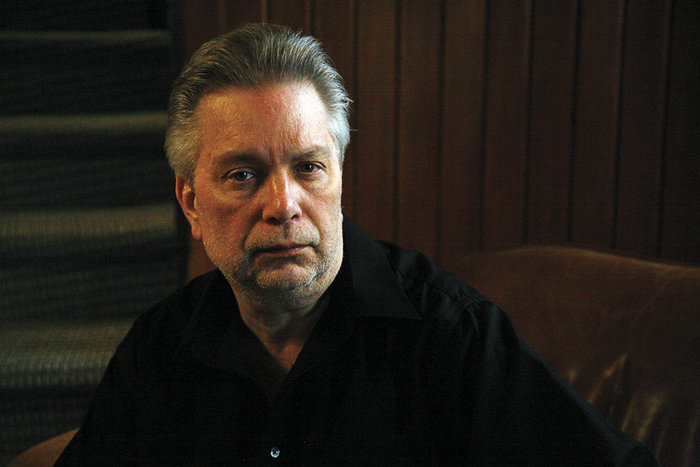When Jim Fusilli, rock music critic for the Wall Street Journal, tells you to try your hand at writing crime noir, you try your hand at writing crime noir. And so Weehawken resident Gary Cahill gave it a shot.
When your first shot at writing crime noir lands you a spot in the world-famous Ellery Queen’s Mystery Magazine, you are either supremely blessed or supremely talented. Either way, Cahill had no choice but to continue with his newfound, well-accoladed hobby.
Cahill’s life afforded him ample fodder for his writing career, past and present. He spent decades in New York City’s Hell’s Kitchen working at a music pro shop for arrangers and composers. Then he left that life to join the staff at the Weehawken Library.
Cahill’s Kitchen was not the cleaned-up, preppy sort where one can stroll for a drink or a dinner or a collared shirt at American Eagle like it is today. It was the dark, all-hours, racketeering-wracked “Westies” cop-and-mob Hell’s Kitchen that manifested literary gold the likes of Don Delillo and Tim O’Mara.
“Nobody is clean [in my stories], and they all have it coming one way or another.” – Gary Cahill
____________
One of four famous authors had dropped out of an event O’Mara had planned at Bar 82. O’Mara happened to read Cahill’s latest short, “The Damndest Thing,” which had been published in the fall edition of the quarterly crime ’zine, “The First Line.” So Cahill was invited to read.
“What was I going to say, ‘No thanks, I just can’t swing it’?” Cahill laughed. “Of course I said yes. It was another example of being in the right place at the right time. As Woody Allen once said, 80 percent of success is showing up.”
Speaking (or writing) of fate
Crime noir is a longstanding literary genre, but it seems to be turning in a darker, less plot-driven direction; one which Cahill finds fascinating and suitable to his ability as a writer. It’s all about setting the scene and capturing a slice of a character’s life as if one simply slips in and out of their reality and realizes that morality and its different “sides” are separated by a very thin line.
The ease in which a character can slip from one way of life into another is largely dependent upon fate, Cahill believes.
“Everyone is guilty in my stories,” Cahill explained. “Nobody is clean, and they all have it coming one way or another. If you walk into the wrong deli to buy a pack of cigarettes, visit the wrong woman while you’re selling insurance, or stop in at the wrong gas station, in that instance you realize your whole existence can just be gone, or gone horribly wrong.”
He explained that this type of considerably depressive, existential view on life was birthed from the stock market crash and the subsequent crash of the American economy in general back in the ’30s. From that sprung novelist greats like Raymond Chandler and James Crane who, Cahill said, produced the hardboiled, doom-filled crime classics he loves.
Now, perhaps revived by the more recent economic downturn, the genre has reemerged, but this time it’s streamlined into shorter stories. Condensed into the essentials like poetry, he said, or a wine reduction, it caters, perhaps, to the American public’s notoriously shortened attention span.
“Raymond Chandler wrote, ‘Down these mean streets walks a man who is not himself mean,’ ” Cahill said. “His heroes stand above what they’re doing and can’t get out of the mess. My people are in the mess and still have some sense of right and wrong, with honor across the board. They got into the mess themselves, and now they must make the best of it without blaming anybody else.”
Behind the first line
Cahill grew up in Weehawken a block and a half from the library, so books literally loomed over him since birth. The path he chose took him through the “paper days” of music before computers and serious illegal substance enforcement cleaned up the industry. But his experiences also lent him a literary mission which he plans on pursuing as long as he can.
“I write from the perspective of someone who wouldn’t normally be in the ‘business’ because one day they said yes to the $400 they really needed rather than taking a higher road,” Cahill said. “I watched this sort of thing from the sidelines every day, and now I write it.”
On Oct. 22 at 8 p.m., Cahill will present his short “The Damndest Thing” at Bar 82 located at 136 Second Ave. in Manhattan. He will present alongside O’Mara, Charles Salzberg, and Annamaria Alfieri, and will sell copies of “The First Line,” as he said, “Priced to move at $3.”
He is currently working on his next noir short and can be found amongst the stacks at the Weehawken Library. You can find him on the web at www.mysterywriters.org/user/3261.
Gennarose Pope may be reached at gpope@hudsonreporter.com
